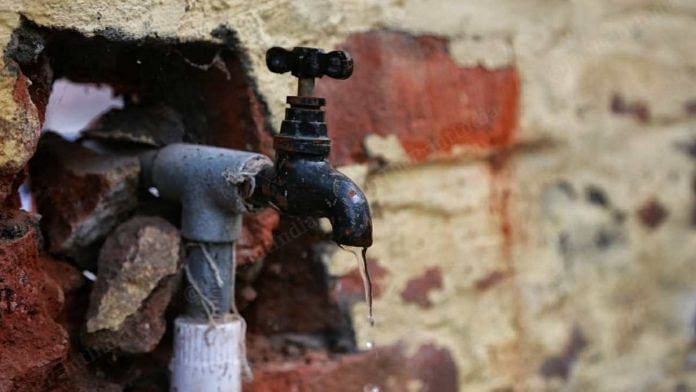New Delhi: Here is some good news for people complaining about poor water quality flowing from their household taps.
Under the government’s flagship Jal Jeevan Mission, you can now get the water tested at the nearest government accredited laboratory after paying a nominal fee. You can also check the test result at the convenience of a click, sitting at home. If the water sample fails the quality test, you can inform the concerned authorities online and can also check if any remedial action has been taken.
The Department of Drinking Water and Sanitation under the Jal Shakti ministry has made operational the Water Quality Management Information System (WQMIS), a dedicated one-stop information portal, where an individual can register and get information about the laboratories in his/her neighbourhood/district and book a testing slot. The individual can take/send the sample to the laboratory and once testing is done, check the report online.
The laboratories have been mandated to upload the result on the WQMIS portal once testing is completed. “It’s similar to the online system for Covid testing. You book a slot, take your water sample and then check your test report online,” a senior official of the Department of Drinking Water and Sanitation told ThePrint.
So far only 2001 government laboratories have been registered with the WQMIS portal. The ministry is getting more and more laboratories to register, a mandatory requirement under the Jal Jeevan Mission.
The official said that while providing potable tap water connection in each and every household in rural India under the government’s flagship Nal Se Jal is already underway, empowering citizens to test the quality of the water will be the next step.
Regular analysis of the database stored at the WQMIS portal will also provide vital clues in investigating disease outbreaks and help in monitoring and surveillance of water supply, verify the safety of drinking water and help in taking preventive measures, the official added.
Also read: After months of wrangling, Modi govt now likely to pay part of Andhra’s Polavaram dam project
Labs in both rural and urban areas
While Nal Se Jal covers rural areas, the laboratories are accessible to the public in rural as well as urban areas.
“All government-funded laboratories have been mandated to register with WQMIS. The portal will display on a real-time basis, the total water samples collected across states that have been registered with laboratories for testing, and how many have been tested,” a second senior official of the Department of Drinking Water and Sanitation told ThePrint.
For instance, until Sunday (22 August), a total of 9.41 lakh water samples have been received at the 2001 active laboratories across India. Of this 7.27 lakh samples have been tested and some 50,000 have been found to be contaminated. So far remedial action has been taken in 1,169 cases.
On an average, 12,000 water samples are getting registered and tested every day, the official said.
So far, the official added, it was either the Public Health Engineering (PHE) department or Jal Nigam authorities in respective states, who were mandated to pick random water samples to monitor quality. The reports were not shared with all stakeholders.
The Department of Drinking Water and Sanitation is also training five women in every village to regularly test the quality of water using Field Test Kits and get indicative results. If the sample collected is contaminated and fails the test, the gram panchayat can inform the concerned authorities for remedial action.
The gram panchayats will also have to upload the test result at the WQMIS portal.
Nearly 20 states in India have drinking water sources contaminated with arsenic, fluoride, and heavy metals.
According to an assessment by the Central Ground Water Board in 2018, 52 per cent of all the blocks in the country have at least one of the geogenic contaminants such as arsenic, chloride, fluoride, iron, nitrate, etc.
As reported by the states/UTs in the Department of Drinking Water and Sanitation Integrated Management Information System, currently, groundwater sources in 49,232 habitations in India are having water quality issues. “Nearly 20 states in India have drinking water sources contaminated with arsenic, fluoride, nitrate, iron, salinity or heavy metals etc,” according to the system.
Apart from these contaminants, there are 61 priority districts identified by the Ministry of Health and Family Welfare as affected by Japanese Encephalitis and Acute Encephalitis Syndrome across five states.
(Edited by Arun Prashanth)
Also read: Jurisdiction of Godavari & Krishna boards finally notified as AP-Telangana water row rages



